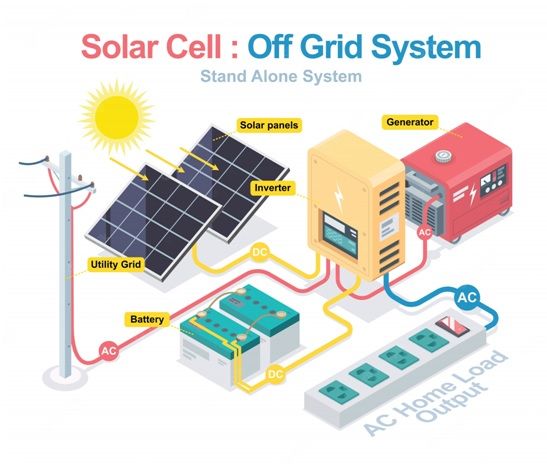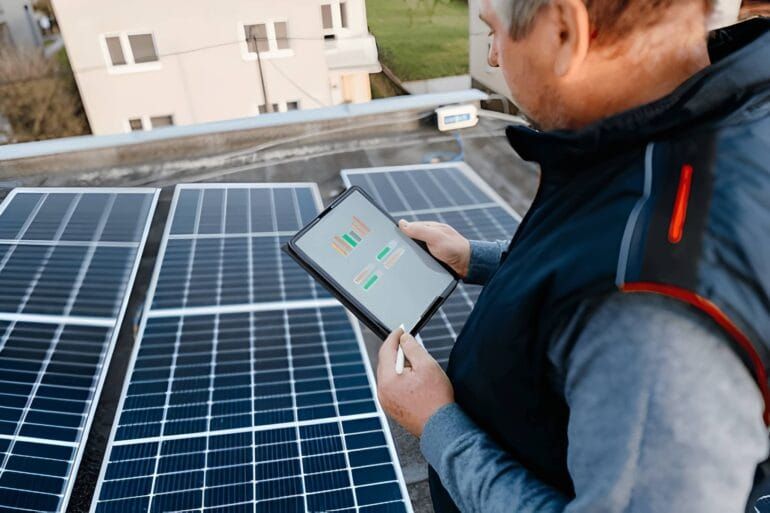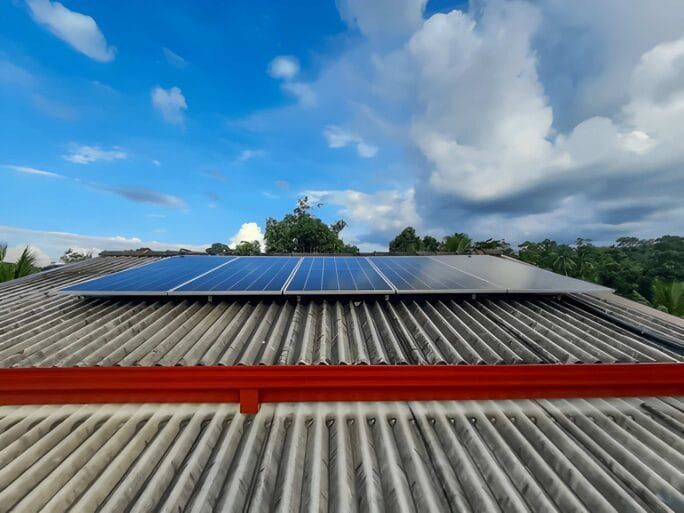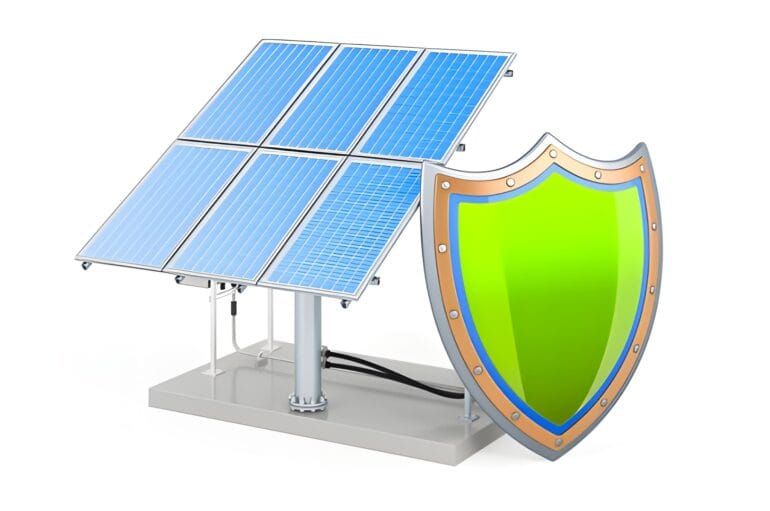If you’ve ever lived on a remote island, spent extended time camping, or are lucky enough to spend your working days surrounded by breathtaking nature, you know how important it is to unplug from the hustle and bustle of everyday life. These getaways from the stressors of modern living are great for the soul, but what happens when a heavy rainstorm rolls in and cuts off your electricity? What if there’s no cellular service in the area where you plan to camp for an extended period of time? An off grid solar system can be a perfect solution for anyone looking to disconnect, but not cut off from power. A fully functioning off-grid solar system can keep your home running even if you have no access to traditional grid energy. The following guide covers everything you need to know about these eco-friendly setups.
What is an Off Grid solar system?
An off grid solar system is an independent, stand-alone energy system. It’s designed to produce electricity without being connected to an existing grid, but it can also store and distribute that electricity when no other power sources are available. The system uses the power of the sun to generate electricity, and it stores that energy in batteries that can be used whenever needed. That’s why it’s sometimes called solar photovoltaic (PV) energy—because it uses solar panels to generate electricity and PV panels to store it.
How does an Off Grid solar system work?
The components of an off grid solar system are designed to work in tandem to produce and distribute electricity. Solar panels sit on the roof of your home and are used to capture the sun’s energy. This energy is then transferred to a charge controller, which regulates the flow of electricity. That electricity is then stored in batteries, where it’s held until it’s needed. The batteries can either be connected directly to appliances, or they can be connected to a grid-tie inverter. The grid-tie inverter connects to your home’s regular power grid and can transfer electricity from the batteries back into the grid when needed. A fully functional off-grid solar system will provide power during cloudy days and at night. It can also be helpful in areas that are prone to frequent power outages.
Benefits of an Off Grid solar system
– Safety – Solar panels are designed to be extremely durable, but they can still pose a fire risk if installed incorrectly. The fact that an off grid solar system is not connected to your home’s power grid means that you don’t have to worry about potential fires. – No Utility Bills – One of the biggest advantages of an off-grid solar system is that it allows you to generate your own electricity without relying on utility companies. – No Grid Interconnection – Another great thing about an off-grid solar system is that it doesn’t connect to the grid. This means that you’re not responsible for supplying electricity to other homes. – No Interference – One downside of grid-tied solar systems is that they can sometimes cause power outages in nearby homes when they’re accidentally overloaded. With an off-grid solar system, you don’t have to worry about that. – Versatility – Another advantage of off-grid solar systems is that they can be designed to run almost anything. You can power your lights, appliances, or even your water pump with the right system. – No Permitting Required – In some areas, it’s necessary to obtain a permit before installing a grid-tied solar system. With an off-grid solar system, you don’t have to worry about that.
Choosing the right battery for your Off Grid solar system
The choice of battery is as important as the solar panels that generate electricity. Batteries are used to store the electricity from solar panels, and they determine how long an off-grid solar system can run without sunlight. There are a few factors to consider when choosing the right battery for your off-grid solar system: – Lifespan – The lifespan of a battery can determine how long your entire system will last. It’s important to match your power needs with the lifespan of the battery. – Cycle life – This refers to the number of times a battery can be charged and discharged. A battery with a high cycle life can be charged and discharged frequently without losing charge capacity. – Maintenance – Maintenance is an important part of owning any piece of equipment. Batteries are no exception. Some require more maintenance than others.
Which batteries are best for an Off Grid Solar System?
There are thousands of different types of batteries out there. It can be difficult to determine which ones are best for an off grid solar system. Here are some things to consider when choosing batteries: – Lifespan – All batteries lose charge capacity over time. The lifespan of a battery can determine how long your entire system will last. – Cycle life – This refers to the number of times a battery can be charged and discharged. A battery with a high cycle life can be charged and discharged frequently without losing charge capacity. – Maintenance – Maintenance is an important part of owning any piece of equipment. Batteries are no exception. Some require more maintenance than others.
Advantages of a fully functioning Off Grid solar system
– Safety – Solar panels are designed to be extremely durable, but they can still pose a fire risk if installed incorrectly. The fact that an off grid solar system is not connected to your home’s power grid means that you don’t have to worry about potential fires. – No Utility Bills – One of the biggest advantages of an off-grid solar system is that it allows you to generate your own electricity without relying on utility companies. – No Grid Interconnection – Another great thing about an off-grid solar system is that it doesn’t connect to the grid. This means that you’re not responsible for supplying electricity to other homes. – No Interference – One downside of grid-tied solar systems is that they can sometimes cause power outages in nearby homes when they’re accidentally overloaded. With an off-grid solar system, you don’t have to worry about that. – Versatility – Another advantage of off-grid solar systems is that they can be designed to run almost anything. You can power your lights, appliances, or even your water pump with the right system. – No Permitting Required – In some areas, it’s necessary to obtain a permit before installing a grid-tied solar system. With an off-grid solar system, you don’t have to worry about that.
Summing up
An off grid solar system is an independent, stand-alone energy system. It’s designed to produce electricity without being connected to an existing grid, but it can also store and distribute that electricity when no other power sources are available. The system uses the power of the sun to generate electricity, and it stores that energy in batteries that can be used whenever needed. That’s why it’s sometimes called solar photovoltaic (PV) energy—because it uses solar panels to generate electricity and PV panels to store it. An off grid solar system can be a perfect solution for anyone looking to disconnect, but not cut off from power. A fully functioning off grid solar system can keep your home running even if you have no access to traditional grid energy.
FAQs (Frequently Asked Questions)
- What is an off-grid solar system?
An off-grid solar system is a self-sustaining power system that operates independently of the electrical grid. It generates electricity from solar panels and stores it in batteries for use when the sun is not shining.
- How does an off-grid solar system work?
Off-grid solar systems harness sunlight through solar panels, converting it into electricity. This electricity is then used to power appliances and devices directly or stored in batteries for later use.
- What are the components of an off-grid solar system?
An off-grid solar system typically consists of solar panels, a charge controller, batteries for energy storage, an inverter to convert DC power to AC power, and a backup generator (optional) for extended periods of low sunlight.
- Do off-grid solar systems require batteries?
Yes, batteries are an essential component of off-grid solar systems. They store excess solar energy generated during the day for use during nighttime or periods of low sunlight.
- What are the advantages of off-grid solar system packages with batteries?
Off-grid solar system packages with batteries provide energy independence, allowing you to power your home or property even in remote locations. They reduce reliance on the electrical grid, provide backup power during outages, and help reduce utility costs.
- How long do the batteries in off-grid solar systems last?
The lifespan of batteries in off-grid solar systems can vary depending on factors such as battery type, usage patterns, and maintenance. Generally, well-maintained batteries can last anywhere from 5 to 15 years.
- Can off-grid solar systems be expanded in the future?
Yes, off-grid solar systems can be expanded to meet changing energy needs. Additional solar panels and batteries can be added to the system to increase energy generation and storage capacity.
- Are off-grid solar systems suitable for all locations?
Off-grid solar systems can be installed in various locations, including remote areas or places with limited access to the electrical grid. However, the feasibility and effectiveness of the system depend on factors such as available sunlight, energy demand, and system design.
- How much maintenance do off-grid solar systems with batteries require?
Off-grid solar systems with batteries require regular maintenance, including cleaning the solar panels, checking battery connections, and monitoring battery performance. It is recommended to follow the manufacturer’s guidelines and consult with professionals for maintenance.
- What is the cost of installing an off-grid solar system with batteries?
The cost of installing an off-grid solar system with batteries can vary depending on factors such as system size, battery capacity, and installation requirements. It is best to consult with solar system providers for accurate cost estimates based on your specific needs.







